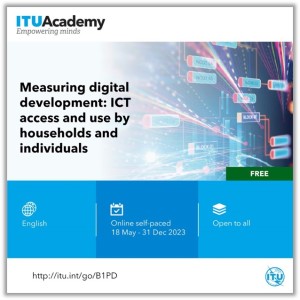
The training aims to strengthen the capacity of countries to produce ICT indicators and statistics according to international standards and methodologies. It is intended to assist national statistical offices in collecting and compiling ICT statistics on the access and use to ICTs by households and individuals, by providing guidance on the collection, processing, evaluation and dissemination of ICT household statistics. It presents the definitions of the indicators following the
ITU Manual for measuring ICT access and use by households and individuals, as well practical advice how to plan, design and conduct ICT household surveys.
The training is intended for participants who are responsible for collecting and/or producing statistics on the access to and use of ICTs by households and individuals, which is usually the responsibility of national statistical offices. Sometimes surveys are done in collaboration with ICT ministries or the regulatory agency, which might therefore benefit from the training as well. ICT analysts and researchers, as well as the press and students will also find the training useful in understanding the uptake of ICTs around the world, and for monitoring and benchmarking digital development.
After taking this course, participants should be able to manage the conduct of an ICT household survey at the national level, which will allow to compile indicators on the access to and use of ICTs by households and individuals following the standards set by the ITU Manual for measuring ICT access and use by households and individuals. Participants completing the course will have a state-of-the-art understanding of the key methodological considerations, challenges, and global standards applied for collecting globally comparable data. They will first learn about the need for coordination at the national level, followed by all the steps necessary to plan and conduct an ICT household survey. Next the core indicators emanating from the survey will be taught. Participants will then learn how to design a survey that will collect these indicators, and how a survey should be processed and disseminated. Finally, participants will learn how to evaluate the survey process.
The training is available on the ITU Academy portal and is free of charge. The coursework in total requires about three full days, but can be followed at one’s own pace. To register, please visit the
ITU Academy portal, where you must first create an account if you don’t have one already.